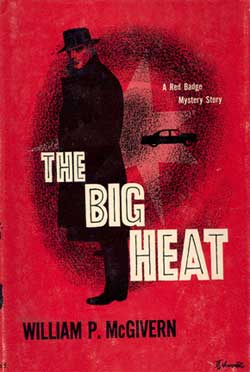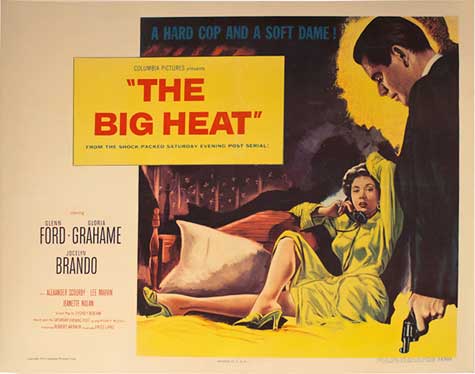 I first saw Fritz Lang’s 1953 film noir The Big Heat decades ago, and I just viewed it again this week. This time I watched it immediately after reading William P. McGivern’s novel of the same title. This is the latest in my series of posts where I rave about an underappreciated noir novel while commenting on a better-known film that was made from it. Lang’s big screen feature is, of course, a gem, and one that any fan of film noir should get to know if they don’t already. McGivern’s work of fiction, which originally appeared in the pages of The Saturday Evening Post, then was published as a novel in the same year as the movie’s release, deserves lofty status among those who appreciate hard-edged crime tales as they appear on the printed page.
I first saw Fritz Lang’s 1953 film noir The Big Heat decades ago, and I just viewed it again this week. This time I watched it immediately after reading William P. McGivern’s novel of the same title. This is the latest in my series of posts where I rave about an underappreciated noir novel while commenting on a better-known film that was made from it. Lang’s big screen feature is, of course, a gem, and one that any fan of film noir should get to know if they don’t already. McGivern’s work of fiction, which originally appeared in the pages of The Saturday Evening Post, then was published as a novel in the same year as the movie’s release, deserves lofty status among those who appreciate hard-edged crime tales as they appear on the printed page.
There’s little difference in the plotline between book and movie, but for present purposes I’ll focus on the story as it is told in the novel. The primary character is Dave Bannion: a sergeant of detectives in a homicide bureau in Philadelphia. Bannion is a big man; much is made of his hulky build in McGivern’s book, whereas he comes across as being of more normal male stature via Glenn Ford’s portrayal of him in the movie. He has a temper that he needs to keep a watch over, to make sure he doesn’t use his great bulk to do bodily harm to others when it’s not warranted. Bannion is a family man, happily married to his good-natured wife and a loving father to their young daughter. He’s also an honest law enforcement agent. In the beginning of the novel (this is not in the movie), some of the detectives on his team are holding a black man on suspicion of a crime, and are ready to work him over physically to sweat a confession out of him; but Bannion feels their grounds for suspecting the man are flimsy (and racially motivated, although that’s only implied in the book), and he tells his boys to let the guy go.
Another aspect of Bannion’s character that is shown in McGivern’s book is the fact that he likes to wind down in the evening with a reading from one of his philosophy books. I like McGivern’s omniscient narrator’s words about this aspect of Bannion’s character:
Bannion read philosophy because it was a relief from the dry and matter-of-fact routine of his own work . . . I read philosophy, he thought, because I’m too weak to stand up against the misery and meaningless heartbreak I run into on the job every day . . . I want to read something which puts sense into life.
And here’s some more on Bannion from the book, words that illustrate what I said before about the detective’s physical build and how he needs to keep control over his use of it:
Bannion’s body was like an engine; he could hook it to a job and it would run all day. He was no body-lover, no beach athlete. He felt an impersonal regard for his strength, as if he were merely a steward whose job was to keep it functioning at par. Bannion had learned that the more able a man is to stop trouble, the less of it he is likely to meet. And he didn’t want trouble, he didn’t want to use his hands on people. When circumstances forced him to, or when his temper jerked him out of control, he inevitably felt disgusted with himself and degraded. He knew the wild streak inside him and had tamed it, or frustrated it rather, by being strong enough to stop trouble before it started.
The story of The Big Heat gets going when a cop from Philly dies, in an apparent act of suicide. Bannion visits the home of the man — Deering in the book and Duncan in the movie — just to pay his respects to the guy’s widow and to make sure there isn’t a possible homicide angle that might need looking into. Deering’s wife tells Bannion that her husband was worried about his health and that this is likely why he killed himself. Bannion leaves the home satisfied that nothing happened here other than a man of the law deciding to end his life.
SEE ALSO: Go missing in these other Lost Classics of Noir!
But then things start getting strange. A cocktail waitress who was once close to Deering gets in touch with Bannion, and informs him that she just saw Deering recently, and that he was in good spirits and practically bursting with vigor. This woman also makes it known to Bannion that the Deerings once owned a second home, at a vacation spot outside of town — not a typical possession for someone on the kind of salary Deering drew. Hmm. Bannion goes back to Mrs. Deering to ask her about the cocktail waitress and the vacation home, and gets a tongue lashing on all counts, as well as an invitation to leave her alone. Next, Bannion’s boss pulls him into his office and tells him to let the widow be and to stop investigating what is a non-case. But when the cocktail waitress is killed shortly after giving her information to Bannion, he knows there was more to Deering’s death than what appeared in the papers, and he knows a cover-up is in play. After doing some digging into things, Bannion has a confrontation with local mob boss Mike Lagana, whom he comes to figure has a role in all these bad doings. And not long after this, Bannion’s wife is killed in an arranged car explosion that was meant for him. With the police brass still telling him to lay off the Deering case, and with his insides now raging with cold fury, at this point Bannion turns in his badge and goes vigilante.

Ok, that’s enough plot. Anyone new to the tale can read McGivern’s novel and/or watch Lang’s film to see what happens when Bannion sets out to both avenge his wife’s death and expose the real cause of Deering’s.
McGivern’s writing is sharp throughout. There’s a hard-edged, no-nonsense feel to the text from the first word to the last, and when the author pauses from the exhilarating action to work in an observational passage, it’s something like this beauty:
Bannion stopped at the first bar he saw and ordered a whiskey. It didn't touch the coldness inside him.
Although Bannion is the clear protagonist of the tale, to me the most interesting character in both the book and movie is that of Debby, the lady friend of Lagana’s top mob henchman. Wonderfully played by Gloria Grahame in Lang’s movie, Debby is a fun-loving gal who appears to be a simple-minded, materialistic lady but who shows depth of caring feeling, sharper-than-you-think-she-is smarts, and laudable courage as she becomes thrown in the middle of Bannion’s war with those he is after. She steals the show both on the screen and in the pages of the novel.
I’ll close with a speech Bannion’s former police boss makes to him long after Bannion has left the department. It sums up the kinds of forces that Bannion is really up against in the story:
You know we don’t make all the rules. We take orders in certain cases, because it’s human nature for some people to run things and other people to be run. And is there anything wrong with that? Hell, it’s the story of the world. If you don’t take the orders, if you decide to be a hero, does that change things? Not one damn bit. They find someone else who’d do the job, and your personal little revolt is just a waste of time.
Brian Greene's short stories, personal essays, and writings on books, music, and film have appeared in more than 20 different publications since 2008. His articles on crime fiction have also been published by Crime Time, Paperback Parade, Noir Originals, and Mulholland Books. Brian lives in Durham, NC with his wife Abby, their daughters Violet and Melody, their cat Rita Lee, and too many books. Follow Brian on Twitter @brianjoebrain.
See all posts by Brian Greene for Criminal Element.

Seriously excellent article and writing!
@Noirful: Thanks! Nice to hear.